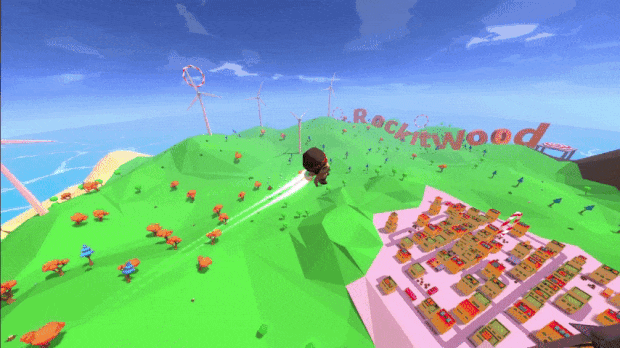Radical Rockits is out to make the jetpack fun again

Pity the poor jetpack, forever stuck at the dweeby-but-not-practical stage of technological development. Sure, the jetpack looked neat when Buck Rogers used one to zoom through the sky in a 1928 edition of the comic series Amazing Stories, but it’s basically all been downhill since then. In order to take off and even fleetingly maneuver, jetpacks have to be large and bulky, which is fine if all you want to do is take off and even fleetingly maneuver. But what if you want to look cool while doing it? Good luck with that; the jetpack is the Google Glass of aviation devices.
But if the jetpack can’t be fun in real life, maybe it can escape gravity and its unrelenting feebleness in the virtual world. That, at least, is the promise of Radical Rockits, which the developers at Rage Squid describe as “a physics jetpack sandbox without any objectives.” That is a reasonably fair assessment insofar as the game offers no winning condition. One simply flies about the game’s polygonal island for as long as possible, spinning and flipping as exuberantly as is permitted. Players can either share control of one character or each occupy a quarter of the screen with their own adventures to be compared and contrasted.
you realize why the jetpack was once such a promising idea
Even though Radical Rockits has no score, it’s a bit disingenuous to say that it is a game without objectives. Surely staying aloft is an objective. If you’ve crashed to earth, there really isn’t much else for you to do. That isn’t a design flaw; it’s just how the game works. Thus, while Radical Rockits is much sleeker than its real life equivalents, its experience is still bound by the same physical imperatives.
Radical Rockits at least manages to maintain a modicum of cheerfulness about the jetpack. Its world is bright and fun and you want to spin around for as long as possible. Playing it, you realize why the jetpack was once such a promising idea. Whether such a moment is a cause for optimism, however, remains up for debate. As NASA researcher Mark Wells told Jetpack Dreams author Marc Montadon: “For a lot of us, the future once looked very exciting—so it’s a nostalgia for that lost future. Now the future looks more scary than anything else.”



